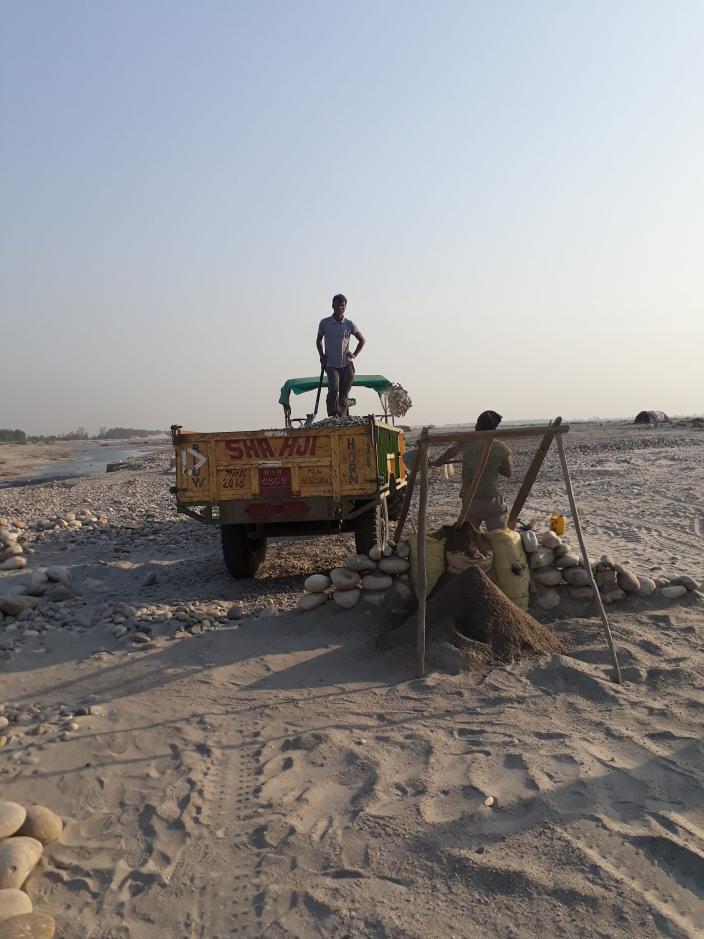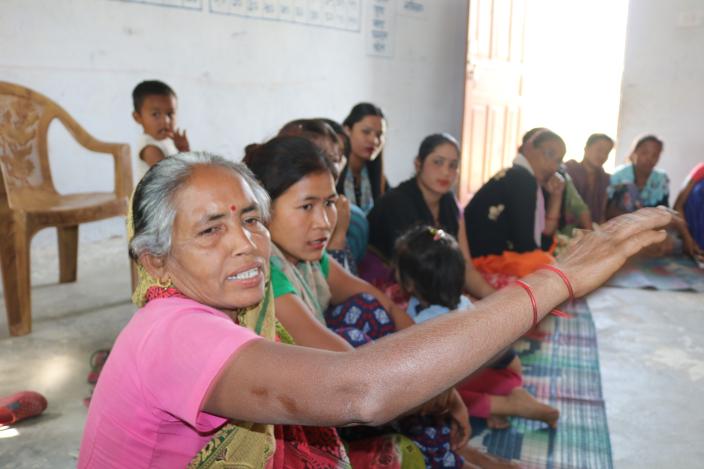Rajan Subedi and Samira Shakya
Gomati Malla, 48, from Bhimdutta Municipality lives very close to the Mahakali River but her farmland is devoid of irrigation. There is an irrigation canal that flows through the Sharada barrage but Malla is unable to utilize the water as her land lies above the canal. That, however, does not exempt her from paying tax.
Forty-five-year-old Ratna Devi Bharati is also from the same region who has seen how the water from Sharada Barrage has caused fatalities. “There was a case when a tractor driver lost his life and his newly purchased tractor when the water flowed down sweeping him away,” she recalls. Bharati and her family members go to the river to collect sand, crush stones into gravels and sell them to make enough income. “If there was an early warning system, it could prevent causalities,” she says.

Gomati purchased an electric motor to pump water from the canal to solve her problem but due to low voltage of electricity supply, she could not use it. She had shared her problem in the then village development committee’s office but she says her issue was not taken seriously.
The Mahakali River flows both in Nepal and India and it is a source of livelihood of thousands of people; however these people who live very close to the river continue to face challenges accessing the natural resource. Considering these issues and challenges, Oxfam in Nepal established Women Empowerment Centre (WEC) in December 2017, with its partner organization Nepal Environment and Equity Development Society (NEEDS) in Kanchanpur under TROSA (Transboundary Rivers of South Asia) project.
The TROSA project aims at reducing poverty and marginalization of vulnerable river basin communities through increased access to and control over riverine water resources. When Gomati told her problems at the WEC, she was suggested to share her issues with Bhim Dutta municipality officials. Five other members of WEC shared that they had similar problems and together they shared this with the municipality officials. They committed to install a voltage transformer and regulate electricity supply. Once it will be installed, it will benefit around 150 families including that of Gomati. "Now, I am hopeful that my problem will be solved soon. I have learned that if we are united, it is easier to solve problem,” said Gomati. To address concerns of people like Bharati on the other hand, the five-year TROSA project (funded by Swedish International Development Cooperation Agency (SIDA)) will also install early warning system.

Government’s commitment
Meanwhile, government authorities have pledged to protect the rights of the people living close to the transboundary rivers. On the eve of World Water Day 2018, Governor of Province 7, Mohan Raj Malla, local government officials and civil society organisations committed to protecting the rights of the communities, of both Nepal and India, to use and control over water and river resources from Mahakali River through a declaration. The declaration signed by Mayors, Deputy Mayors, Chief of District Coordination Committees and Civil Society Organisations from Kanchanpur, Dadeldhura, Baitadi, and Darchula districts states that an institutional arrangement will be set up to effectively implement transboundary water governance policies.
“There is a deep relationship between human civilization and river, we have our existence because of the rivers. Experts say that water will be the cause of next big conflict in the world. Therefore, we must realize our responsibilities to protect our rivers,” said Governor Malla.
Unofficial translation of the declaration is given below:
Dhangadi Declaration
- We commit to address the transboundary water issues and improve livelihood of the vulnerable communities of Mahakali river basins in Nepal and India through appropriate policies and programmes
- We commit to set up and implement institutional policies by conducting research on topics such as appropriate utilization of river resources, conservation of bio-diversity and rights of river basin communities etc. for the effective implementation of community centric plans and sustainable management of river.
- We commit to play an effective role for collaboration and cooperation with Local Government for improved water governance and overall development of vulnerable communities living in Mahakali river basin.
- We commit to work in cooperation with Civil Society Organizations, government and non-government actors to empower and ensure water rights of vulnerable women along the Mahakali river basin.
- We commit to set up Federal and Provincial Level Expert Commission on Mahakali River basin in consultation with concerned stakeholders for conservation, utilization and overall development of the Mahakali River.
- We commit to urge Government of Nepal to set up transboundary Mahakali river Commission as provisioned in Mahakali Treaty between Nepal and India for conservation, utilization and overall development of the Mahakali River.
“There was a case when a tractor driver lost his life and his newly purchased tractor when the water flowed down sweeping him away”
